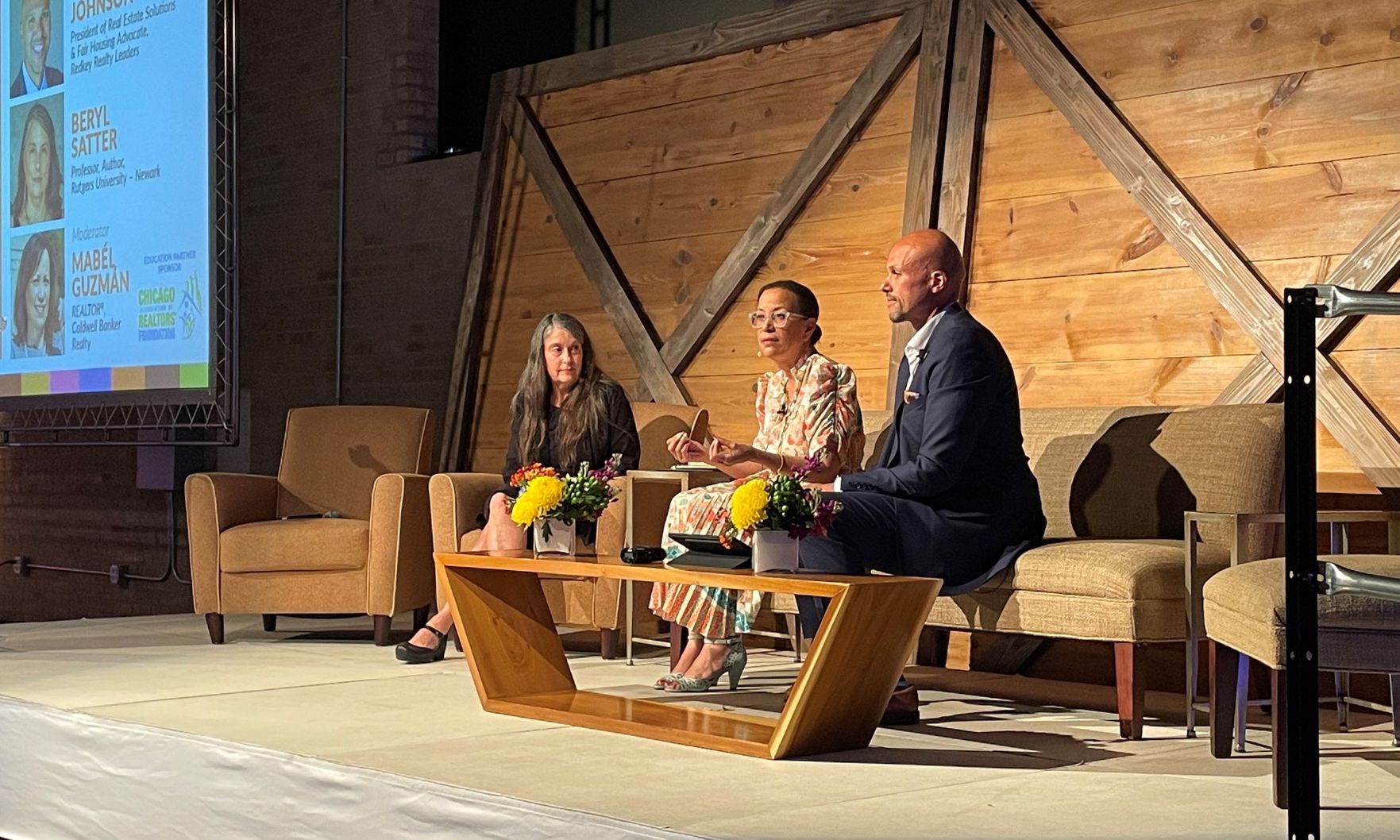Diversity, equity, inclusion: over the last few years, those three words have dominated corporate dialogue. But how do we go further to ensure true equity in the workplace? In our communities at large? These were the questions asked yesterday at the 360 Summit: Leading with Diversity, Equity and Inclusion, hosted by the Chicago Association of REALTORS® (CAR).
The daylong event, held at Venue West near Fulton Market, featured many panels which tackled various aspects of diversity, equity and inclusion (DEI). Following opening remarks from CAR President Antje Gehrken, eXp Realtor Sam Powell and Ware Realty Group Managing Broker Sarah Ware, Kelly McDonald took to the stage to offer concrete dos and don’ts when it comes building a diverse workplace. McDonald is an author and professional speaker whose work focuses on DEI, and her presentation offered a solid baseline for what effective DEI practices can look like in today’s environment.
But the focus of the day was not confined to company initiatives. That afternoon, Beryl Satter, a historian and Rutgers University professor, presented a poignant and personal look at Chicago’s segregated history. Satter’s father, Mark J. Satter, was a prominent local lawyer who represented black families fighting land sale contract foreclosures throughout the 1950s and ‘60s.
Land sale contracts were a widespread practice in Chicago’s black neighborhoods during that time. Since families there were precluded from traditional bank mortgages due to redlining, contract sales emerged as something of an alternative. But while they offered the illusion of mortgage payments, these contracts carried none of the typical protections.
Amid the Great Migration, and the resultant “white flight,” real estate speculators snatched up homes at a significant discount within Chicago’s “Black Belt”. Those houses were then sold on contract to incoming black families for at a massive markup. But the contracts were a scam. Monthly payments were set at a high interest with no equity. And if owners defaulted on even one bill, they could — and often did — legally lose the property, along with everything paid into it. Citing a recent Duke University study, Satter said Chicago’s black community lost between $3 and $4 billion.
Satter discussed the case of Albert and Sally Bolton who lost their home over missing one payment, due to the costs of fixing a code violation. The Boltons also appear in Satter’s book, “Family Properties: How the Struggle Over Race and Real Estate Transformed Chicago and Urban America.” Published in 2009, the work is considered a key investigation into the specific and pervasive segregation that exists in Chicago. In the panel discussion that followed Satter’s talk, Realtor Mabel Guzman called it “required reading for anyone in Chicago real estate.”
Guzman moderated the panel which featured Nate Johnson, president of real estate solutions for Redkey Realty Leaders, alongside Satter. Kicking off the discussion, Guzman emphasized that Chicago is one of the most segregated cities in America. “And this profession that we’re in was involved in [making it that way],” she said. “We were complicit.” So, she wondered, what factors are currently keeping the city segregated?
Offering a historian’s perspective, Satter said we must begin by understanding why the communities are so economically depressed. And Johnson agreed, saying, “The segregated communities have been created strategically.” However, their opinions diverged somewhat when it came to the next steps — specifically, public policy.
Johnson, citing historic examples, made the case that federal policies have routinely failed to upend segregation. His own take is that it comes back to “personal thought.” As a fair housing advocate, he places greater importance on swaying the minds of individuals. “Who we elect is going to mirror our thoughts, opinions, views,” he said. “We have to get back to a space where we have the majority of the room willing to do what’s right.”
Satter, though, pointed out that the fair housing policies created by our government have rarely been enforced. “We need repetitive policies that have teeth,” she said. “It’s possible but not if we continue to be fooled over and over by language that implies it’s being taken care of.”
Although she and Johnson presented two schools of thought for navigating Chicago’s own segregation crisis, there was a consensus that the current conditions stem from predatory real estate practices. And as a real estate community, it’s vital to understand the past in order to move forward.
Panels from the rest of the day included:
Putting Action in Your Bottom Line: Achieve Real Action and Results Through DEI
Featuring: Baird & Warner CEO Stephen Baird, CAR Director Ayoub Rabah, Dream Town Realty CEO Yuval Degani and Century 21 Realty President/CEO Sharon Wong, moderated by CAR CEO Michelle Mills Clement
Re-Thinking Client Experiences: Leverage Multicultural Housing Data To Identify Opportunities and Drive Solutions
Featuring: NAHREP President Ernesto Alcaraz, NAR Director of Engagement, Diversity and Inclusion Ryan Davis, AREAA President Elizabeth Goodchild, Dearborn REALIST Board Immediate Past President Courtney Jones and LGBTQ+ Real Estate Alliance National Vice-President Anita Legacy Blue, moderated by Illinois REALTORS® President Ezekiel Morris
Breaking Ground in Commercial Real Estate: The Power of Allyship and Having a Seat at the Table
Featuring: KBM Realty Executive Broker Bonita Harrison, GardnerGlobal Founder/CEO Jaebadiah Gardner and Caton Commercial COO Amy Hall, moderated by CAR Director of Commercial Services Jacob Knabb
From Personal Achievement to Political Activism: Disability Advocacy, Awareness and Education with Mia Ives-Rublee
Featuring: Disability Justice Initiative at American Progress Director Mia Ices-Rublee, moderated by CAR President Antje Gehrken
